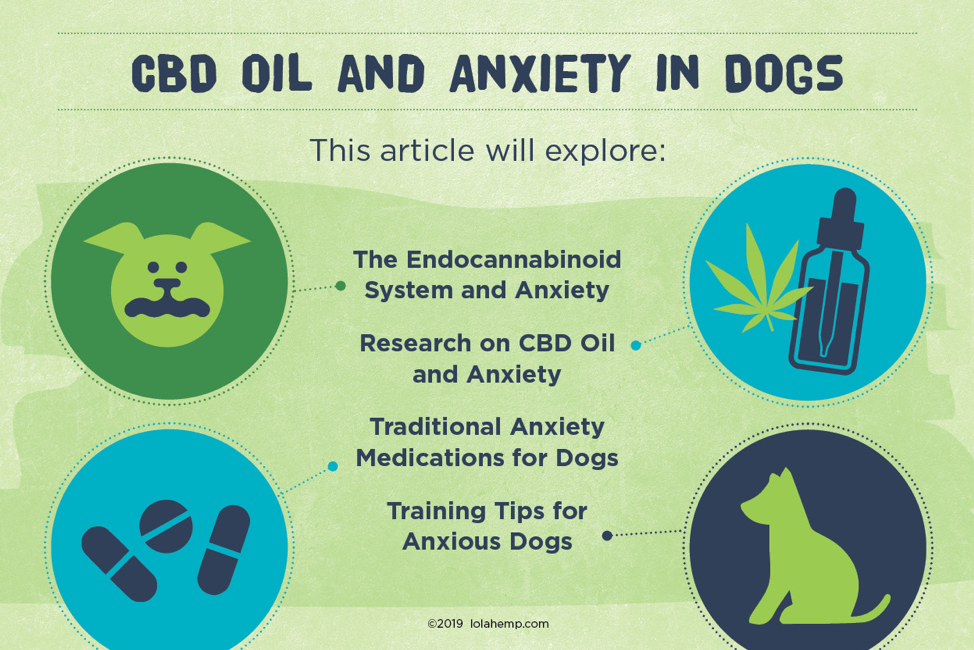Does your dog suffer from anxiety? If so, perhaps you have heard that CBD oil, a natural extract from the hemp plant, may offer your pet some calming relief. If so, you have come to the right place. We will explore the research behind CBD oil and anxiety as well as some great training tips to help you help your canine relax.

The Endocannabinoid System in Dogs
The Endocannabinoid System (ECS) is a biological system that works with the central and peripheral nervous systems as well as several organs in the body. The ECS was discovered in 1990 by medical researchers, and later confirmed to be present in all mammals, including dogs. The ECS is a signaling system that works to promote homeostasis, or balance, in a variety of biological processes including mood, appetite, digestion, sleep, pain, inflammation, skin health, and more.
Compounds found in the cannabis family of plants such as CBD (also known as cannabidiol) are known to activate the ECS in several ways, many of which have been identified as having potential health benefits currently being explored by medical researchers. Hemp, a form of cannabis that is low in the psychoactive compound THC, is very high in CBD. Because CBD does not get people (or dogs) "high" or impair cognitive functioning, it has become the target of a tremendous amount of research in the last few decades.
Many people are skeptical when they hear about any product being suggested for such a wide variety of different ailments. This skepticism is natural, after all, no one wants to pay for "snake oil." However, the fact that the ECS is involved in the function of several different systems and processes in the body is actually now a well-known scientific fact. What is less understood is precisely how the cannabinoids interact with the ECS as well as what dosing and application types (oral, sublingual, or topical) are most effective for which ailments. This has been the focus of much of the medical research on cannabidiol in the last 20 years.
Another thing about the ECS that has a substantial amount of scientific evidence is the role it plays in regulating anxiety. In fact, researchers in a 2012 article published in the Journal of Pharmacology reported "In recent years, mechanistic evidence for the involvement of the endocannabinoid system (ECS) in anxiety and fear has been accumulated. Elucidation of the role of the ECS in fear and anxiety may provide new therapeutic leads."

Research on CBD Oil and Anxiety
Among the potential health benefits of cannabidiol, one of the most well studied is its anti-anxiety properties. Let's take a look at just a few of them:
- One 2010 study showed evidence that CBD oil significantly decreased the subjects reported anxiety levels which corresponded to changes in blood flow in the limbic and paralimbic regions of the brain.
- Other studies have shown that the antianxiety effect of CBD may be due to the activation of 5-HT1A receptors in the central nervous system.
- A 2019 study showed that 57 out of 79 (79.2%) subjects reported decreased anxiety with CBD treatments.
- Similar anti-anxiety effects have been reported in numerous studies on laboratory animals.
Anxiety in humans and dogs are classified in different ways. Of course, this makes sense, after all, we can talk to people to learn more about the thought processes related to their anxiety, and with dogs we are limited to observing their behavior. However, when it comes to research on CBD, what we do know about studies on humans is that it has been shown in various studies to have therapeutic potential in a wide variety of different types of anxiety, including:

Anxiety in Dogs
When it comes to canines, we tend to understand anxiety by certain behaviors. Thus, they are classified in different ways by animal behaviorists. For example, if a known trigger for anxiety is identified, we often think of our canine companion as having a phobia such as a fear of thunder or car rides.
Many professional trainers and animal behaviorists alike also understand anxiety to be active in cases of aggression where a past trauma or poor socialization as a puppy may have contributed to an insecure dog who may choose a "fight" response in the presence of other dogs. Anxiety might also be the root cause of a common behavioral issue that all too many owners are familiar with: separation anxiety.
Unfortunately, veterinary science has not kept pace with research on lab animals and people when it comes to assessing the calming effect of CBD oil for dog anxiety. However, increasing numbers of veterinarians, trainers, and pet owners alike have witnessed the calming effect of cannabidiol, particularly full spectrum products.
CBD Oil and Dog Phobias: The Role of "Learned Fear"
One of the more recent advances in research on the Endocannabinoid System and anxiety is the role it plays in learned fear. As a survival mechanism, the brains of mammals are designed so that when something traumatic happens, an association is formed with a trigger from the environment. For example, if you get burned by fire, your body and brain learn that this pain is associated with the fire, which helps you to be more careful next time you're around fire.
It is obvious how learning to fear real dangers is important for long term survival and health. However, as we see in many anxiety related disorders, particularly in cases where there has been some kind of trauma such as in PTSD, this learned fear has gone haywire. That is, a hyper-reactive response to a trigger that may have been around during the time of the trauma but may not have been the direct cause of the trauma, can become disabling and unmanageable.
It is not uncommon for our pets to develop phobias from the same learned fear response. To make matters worse, each time the fear state is experienced in response to the trigger, the neural networks that connect the trigger and the emotional response of fear can get stronger. If you have a dog with fear of thunderstorms, for example, you may be familiar with how a learned fear can get worse over time.
Recent research suggests that CBD oil may actually help to extinguish learned fear. Here is what the researchers had to say: "The evidence indicates that cannabidiol reduces learned fear in different ways: (1) cannabidiol decreases fear expression acutely, (2) cannabidiol disrupts memory reconsolidation, leading to sustained fear attenuation upon memory retrieval, and (3) cannabidiol enhances extinction, the psychological process by which exposure therapy inhibits learned fear."
The last part of this three-pronged effect is perhaps the most important when it comes to the potential for CBD oil to help you work with your dog to extinguish fears through behavior modification programs, a topic which we will explore in more detail below.

Traditional Medications for Canine Anxiety
There are traditional pharmaceuticals that are often prescribed by veterinarians for pets with anxiety problems. Unfortunately, they can come with some negative side effects that can sometimes outweigh the benefits. In addition, although some dogs respond very well to these drugs, some simply don't, leaving many vets using a "trial and error" approach to seeing which will be most effective.
It is important to discuss potential side effects and warning signs if you decide to try these powerful pharmaceutical drugs for your dog's anxiety.
For example, antidepressants such as buspirone, fluoxetine, and clomipramine work to increase levels of serotonin, a so called "feel good" hormone. However, an adverse effect known as serotonin syndrome can result from drug interactions or particularly sensitive dogs and can be life threatening.
For situational phobias such as fear of car rides, drugs from the benzodiazepine class (such as valium) may be prescribed. These drugs often have a sedative effect and issues of long term dependency and the development of a drug tolerance are serious considerations. They can also decrease what is known as bite inhibition, creating a potentially dangerous situation for dogs with fear based aggression.
Behavior Modification for Anxious Dogs
If your pet has anxiety, whether it is a general "high-strung" kind of situation, or a very clear trigger (such as separation anxiety), then you may be able to help your dog overcome their anxiety through behavior modification (a.k.a. training). It is an important part of making sure you are doing all you can to help calm your anxious dog. Here are a few quick tips:
Physical Stimulation
Dogs need exercise. In fact, some need a lot of exercise to be happy and balanced. If your pet is generally high strung and anxious, then providing an hour of vigorous exercise a day may go a long way to help reduce their overall nervousness.
Athletic breeds such as Labrador Retrievers, German Shepherds, Huskies and many others benefit from off-leash running on a daily basis. Just clipping on the leash and going for a walk probably isn't enough. Instead, teach your furry friend to play fetch in the backyard, take them for a swim at a local lake, enjoy a nearby dog park, or enroll in a canine friendly sport such as flyball or agility to find a way to get your pet's blood pumping and help tone down that nervous energy.
If you have a senior or disabled dog, consider low impact exercise such as swimming, level walks on soft terrain, or even training them to use the treadmill.
Mental Stimulation
Some of our canine companions are smarter than others. Intelligent dogs, just like intelligent people, need to keep their minds active to stay happy and balanced. In fact, a lot of "dog anxiety" is just misdiagnosed boredom. Herding breeds in particular, such as Border Collies and Australian Shepherds, are notorious for becoming "neurotic" when they are left with nothing to keep their busy minds occupied. Some can become quite destructive in their attempt to figure out "what to do" in the face of extreme boredom.
Training new tricks using positive reinforcement methods, giving your pooch pal a treat puzzle toy, playing games such as "hide and seek" or "Find it!", and enrolling in dog sports are all great ways to keep a smart canine thinking about positive ways to funnel their excess energy.
Desensitization and Reconditioning Training
In the case of specific phobias, trainers use the techniques of desensitization and reconditioning to teach animals to learn to let go of their fears and instead come to associate a trigger with good things they enjoy. Owners can learn these techniques to help their pet find a calmer way of being around their triggers too.
As many pro dog trainers can attest, and as we shared in the research section above, CBD oil may actually enhance this type of training practice by helping to extinguish learned fear. This may translate into faster progress during this often time consuming technique.

Reward Calm Behavior
One of the biggest secrets that professional trainers have is simply knowing when to reward. Any behavior that is rewarded with things your dog loves will eventually crowd out other behaviors that are ignored. This means becoming aware of the kinds of behaviors you like and making a point to go out of your way to reward them.
Many of us, with the best of intentions, reward our dogs when they are displaying anxious behaviors. It might seem like common sense to "comfort" a dog in a panic. However, it can have the unintended consequence of making that panicked state more common...a kind of "go to" emotional state.
Try to notice if you are rewarding anxious behaviors. And, make an effort to start noticing calm behavior and intentionally rewarding it often.
Know When to Hire a Pro Trainer
Anxiety in dogs is complex behavior. The route to recovery can be equally complex. If you are stumped as to what is causing your dog to be anxious, and you have tried adding more exercise and mental stimulation and your training efforts are not translating into a calmer dog, it may be time to hire a pro.
This is especially true if your pet's panic response puts him or her in danger. For example, some will become so frightened during a thunderstorm that they may tear up furniture or even chew up the walls in an attempt to escape. This can quickly become a life threatening situation.
If you decide to hire a professional trainer, be sure to check their references and talk to some previous clients. Make sure they are using positive methods focused on reward rather than overly punitive and punishment based systems which can make anxiety problems much worse.
What Can I Give My Dog for Anxiety?
CBD oil made from hemp is safe for dogs and many owners report that it helps with their dog's anxiety related problems ranging from general anxiety to specific phobias such as a fear of noises. However, given that CBD oil is in high demand, some of the products on the shelves aren't always high quality. You are probably curious about which is the best CBD oil for dogs with anxiety.
There are some excellent options online, such as LolaHemp's. Here is what to look for when shopping:
- The product should be made from organic hemp as pesticides and herbicides can build up in plant extracts.
- Verify the quality and concentration of CBD in the product by viewing online third party lab tests before you buy.
- Look for a full spectrum product which has a range of phytocannabinoids found in the hemp plant.
- Be sure to buy a product made just for dogs since flavorings and artificial sweeteners used in human products can be extremely toxic to our canine companions.
- Choose a product that offers a 30 day money back guarantee so that you can try it without risk.
- Look for companies that offer educational resources about hemp products and accurate dosing guidelines to their customers.





